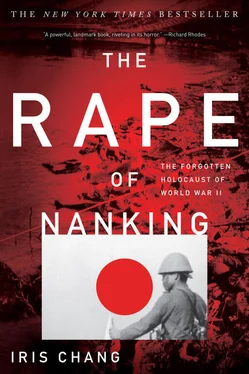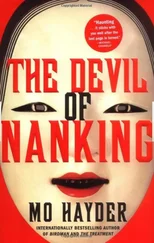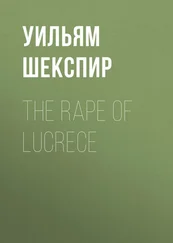Sad to say, the world is still acting as a passive spectator to the second Japanese rape—the refusal of the Japanese to apologize for or even acknowledge their crimes at Nanking, and the attempts by Japanese extremists to erase the event from world history. To get a better handle on the magnitude of the injustice, one only has to compare the postwar restitution that the governments of Japan and Germany have made to their wartime victims. While it is certainly true that money alone cannot give back to murder victims their lost lives or erase from memory the tortures the survivors endured, it can at least convey that what was done to the victims represented the evil of others.
As of 1997 the German government has paid at least DM 88 billion in compensation and reparations and will pay another DM 20 billion by the year 2005. If one factors in all the money the Germans have paid in compensation to individual victims, restitution for lost property, compensatory pensions, payments based on state regulations, final restitution in special cases, and money for global agreements with Israel and sixteen other nations for war damages, the total comes to almost DM 124 billion, or almost $60 billion. The Japanese have paid close to nothing for their wartime crimes. In an era when even the Swiss have pledged billions of dollars to create a fund to replace what was stolen from Jewish bank accounts, many leading officials in Japan continue to believe (or pretend to believe) that their country did nothing that requires compensation, or even apologies, and contend that many of the worst misdeeds their government has been accused of perpetrating never happened and that evidence that they did happen was fabricated by the Chinese and other Japan bashers.
The Japanese government has taken the position that all wartime reparation issues were resolved by the 1952 San Francisco Peace Treaty. A close reading of the treaty, however, reveals that the issue was merely postponed until Japan was in a better financial situation. “It is recognized that Japan should pay reparations to the Allied Powers,” the treaty states in chapter 5, article 14. “Nevertheless it is also recognized that the resources of Japan are not presently sufficient, if it is to maintain a viable economy, to make complete reparations for all such damage and suffering and at the same time meet its other obligations.”
One of the greatest ironies of the cold war is that Japan not only eluded its responsibility to pay reparations but received billions of dollars in aid from the United States, which helped build its former enemy into an economic powerhouse and competitor. Now there is considerable concern in Asia about the prospect of renewed militarism among the Japanese people. During the Reagan administration the United States pushed Japan to beef up its military power—something that alarmed many who had suffered years of Japanese wartime agression. “Those who ignore history tend to become its victims,” warned Carlos Romulo, the Philippine foreign minister and Pulitzer Prize winner who served as General Douglas MacArthur’s aide-de-camp during World War II and understood the competitive national spirit engendered by the Japanese culture. “The Japanese are a very determined people; they have brains. At the end of World War II, no one thought that Japan would become the foremost economic power in the world—but they are. If you give them the chance to become a military power—they will become a military power.”
But the cold war has ended, China is fast emerging from the chrysalis of communism, and other Asian nations that were bullied by Japan during the war may challenge it as they grow ascendant in the international economic arena. The next few years may well witness giant strides in activism regarding Japanese wartime crimes. The American public is growing demographically more Asian. And unlike their parents, whose careers were heavily concentrated in scientific fields, the younger generations of Chinese Americans and Chinese Canadians are fast gaining influence in law, politics, and journalism—professions historically underrepresented by Asians in North America.
Public awareness of the Nanking massacre increased substantially between the time I first started to research this book and the time I finished it. The 1990s saw a proliferation of novels, historical books, and newspaper articles about the Rape of Nanking, the comfort women, Japanese medical experimentation on wartime victims, and other Japanese World War II atrocities. As of 1997 the San Francisco school district plans to include the history of the Rape of Nanking in its curriculum, and blueprints have even been drawn up among Chinese real estate developers to build a Chinese holocaust museum.
As this book neared completion, the U.S. government was starting to respond to activist demands to pressure the Japanese to confront their wartime past. On December 3, 1996, the Department of Justice established a watch list of Japanese war criminals in order to bar them from entering the country. In April 1997, former U.S. Ambassador Walter Mondale told the press that Japan needs to face history honestly and directly and expressed his wish that Japan make a full apology for its war crimes. The Rape of Nanking even made its way into a bill that will soon be introduced into the U.S. House of Representatives. Through the spring of 1997, legislators worked with human rights activists to draft a bill that will condemn Japan for the maltreatment of U.S. and other prisoners during World War II and demand an official apology and compensation for its wartime victims.
The movement to force the Japanese government to face the full truth about the legacy of its wartime government is gaining support even in Japan, where official denials of wartime atrocities have aroused considerable shame and embarrassment among those citizens who see themselves as more than simply and solely Japanese. A vocal minority is convinced that their government must acknowledge its past if it expects to command trust from its neighbors in the future. In 1997 the Japanese Fellowship of Reconciliation released the following statement:
In the past war, Japan was arrogant and pompous, behaved as aggressors in other Asian countries and brought misery to a great number of people, especially in China. For fifteen years around the 1930s, Japan continued to make war against the Chinese. War actions continued and victimized tens of millions of people. Here, we sincerely would like to apologize for Japan’s past mistakes and beg your forgiveness.
The present generation in Japan faces a critical choice. They can continue to delude themselves that the war of Japanese aggression was a holy and just war that Japan happened to lose solely because of American economic power, or they can make a clean break from their nation’s legacy of horror by acknowledging the truth: that the world is a better place because Japan lost the war and was not able to impose its harsh “love” on more people than it did. If modern Japanese do nothing to protect the truth, they run the risk that history will leave them as tarnished as their wartime ancestors.
Japan carries not only the legal burden but the moral obligation to acknowledge the evil it perpetrated at Nanking. At a minimum, the Japanese government needs to issue an official apology to the victims, pay reparations to the people whose lives were destroyed in the rampage, and, most important, educate future generations of Japanese citizens about the true facts of the massacre. These long-overdue steps are crucial for Japan if it expects to deserve respect from the international community—and to achieve closure on a dark chapter that stained its history.
EPILOGUE FOR THE 2011 EDITION
by Brett Douglas,
September 23, 2011
WHEN I FIRST MET my wife, Iris Chang, in October of 1988, she was a beautiful, brilliant, charming girl who was full of life. I wouldn’t have been surprised if someone had told me she would someday write a best-selling book that would be translated into 15 languages. What does surprise me is that I am now writing an epilogue to The Rape of Nanking seven years after her death. With the energy, passion, and drive that Iris showed at age thirty, I thought it was likely she would be writing great books well in her eighties and nineties.
Читать дальше











